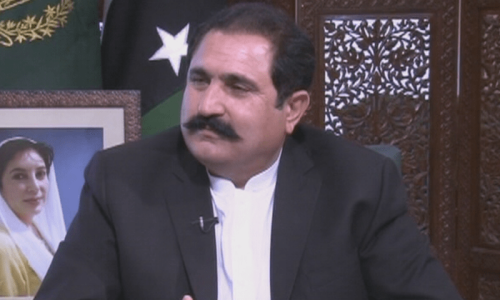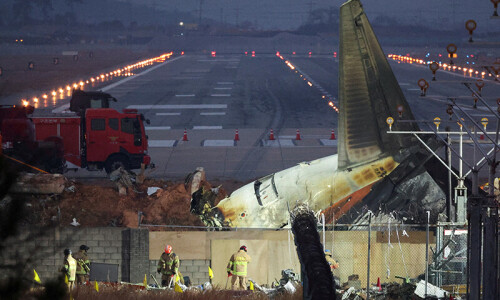SARDAR Akhtar Jan Mengal’s resignation from the National Assembly may have been in the making for some time, given the lack of empathy of the governing party towards his province, but it finally came when he was blocked for two full days from airing his views on the floor of the house in the wake of last month’s violence in Balochistan that claimed over 50 lives.
What else could you expect from the PML-N, one of whose members was chairing the session in the absence of the speaker, who was either busy elsewhere or escaping the embarrassment of the unsavoury task, possibly mandated by the party. These tactics culminated in someone pointing out the lack of quorum as the BNP-M leader rose to speak.
The Baloch leader was bound to raise issues about the security forces, the very entity responsible for ensuring enough PML-N members got into parliament to enable the party to form a government in Islamabad and in Lahore. This looked like one of the many, many return favours.
But was it really a favour? I am reminded of the Urdu proverb naadan dost se daana dushman achha (a wise enemy is better than a foolish friend). I am sure you heard/watched the DG ISPR’s news conference on Thursday.
Let’s address legitimate Baloch grievances and move out of this quagmire.
While he addressed the August 26 upsurge in attacks by Baloch separatists, he also said: “We know that there is a sense of deprivation and perception of state oppression among the people of Balochistan.” He said this perception was exploited by state enemies on foreign instigation and whenever the state took action, this perception was reinforced.
Against this backdrop, PML-N’s denial of the floor to one of the few legitimately-elected representatives of the Baloch people could, and certainly did, reinforce the impression that Baloch voices would not be heard whether in parliament or elsewhere.
Akhtar Jan Mengal himself told this columnist that when Mahrang Baloch came leading a peaceful march to Islamabad to agitate for Baloch rights, the state treated her like an enemy and used force to disperse the Baloch marchers.
“Peaceful Baloch women marchers were treated violently in the capital where they came with a belief in the federation and the Constitution, seeking a just solution to their problems, to find out about our missing and to find a salve for their wounds. And you sprayed them with water cannons, pulled the chadors from their heads and took them to police stations,” he said, adding that if anyone had realised how much support the marchers had received on their journey through the province, they would have understood how counter-productive this mindless action was.
He said he tried for years to get Balochistan treated like any other province but was now admitting his failure. He felt let down by political parties, by the judiciary, by governments and by the military establishment. The whole system and each of its elements has failed to deliver.
“This should have been addressed much earlier … for some reason I held on to a sliver of hope in this system. Balochistan is suffering and they don’t seem to care. The only time they pay attention is when they need votes to pass a bill or a no-confidence motion. It is disheartening but the ball is no longer in our court — the young generation has taken the lead and will decide the future of Balochistan.”
“The state will never understand Balochistan’s plight, its pain … it’s about exploiting its resources. I would like to believe it’s not too late but sadly it is very late now. The horse has bolted, and the barn door is shut.”
I am certain you have heard Akhtar Jan Mengal’s thoughts on TV and in social media interviews, which he has given after submitting his resignation. I have reproduced some of his words here merely to underline the impassioned plea that the despondent Baloch leader is making.
The answers to the questions he is raising are straightforward and simple. When speaking for his institution, the DG ISPR refers to the sense of deprivation and perception of state oppression. It is our collective patriotic duty and responsibility to address this so those opting to take up arms are isolated.
The youth are indeed taking the lead and the Baloch, who have been repeatedly cheated out of their chosen representatives, are responding with vigour. Just see the clips of Mahrang Baloch and Sami Deen Baloch’s reception in Baloch towns and cities. They seem to have captured the hearts and minds of men and women alike as tens of thousands gather around them.
The state needs to acknowledge its excesses and express contrition and initiate a dialogue in earnest with estranged Baloch. And I don’t agree with those who refuse to call them estranged for their own narrow, petty political games and gains.
Advocates of the continued use of the ‘iron hand’ must also do a cost-benefit analysis of the policy in Balochistan where it has so far delivered blood and bodies on all sides. Surely, another approach need also be explored. It is our patriotic duty to do this.
A keen Balochistan observer pointed out the funeral prayers of Mahal Baloch, one of the two Aug 26 suicide bombers who used a vehicle-borne improvised explosive device (VBIED) to breach a security forces base, were attended by a large number of men and women who seemed unafraid to gather publicly in their hundreds.
That is the defiance the state can do without as it can potentially snowball. Public acceptance of militancy can only result in a greater spiral is what one analyst feared. Let’s address legitimate Baloch grievances and move out of this quagmire or be content with more of the same. With pain guaranteed on both sides. We constantly refer to hostile foreign powers. Let’s take this one weapon out of their hands.
The writer is a former editor of Dawn.
Published in Dawn, September 8th, 2024















































Dear visitor, the comments section is undergoing an overhaul and will return soon.